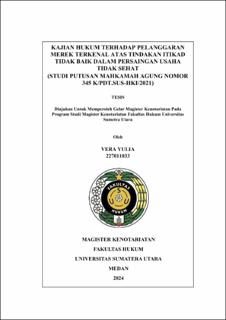| dc.contributor.advisor | Saidin | |
| dc.contributor.advisor | Azwar, Tengku Keizerina Devi | |
| dc.contributor.author | Yulia, Vera | |
| dc.date.accessioned | 2025-02-17T03:11:43Z | |
| dc.date.available | 2025-02-17T03:11:43Z | |
| dc.date.issued | 2024 | |
| dc.identifier.uri | https://repositori.usu.ac.id/handle/123456789/101329 | |
| dc.description.abstract | The legal phenomenon concerning trademark violations, particularly the unauthorized use of famous trademarks not registered in Indonesia, has become a profitable opportunity for irresponsible parties. This typically involves leveraging the reputation of a well-known brand in an attempt to gain financial benefit by registering the brand with the Directorate General of Trademarks, exploiting the first-to-file system despite bad faith intentions. An example of this issue is evident in the "Cheong Kwan Jang" case, as adjudicated in Supreme Court Decision No. 345 K/Pdt.Sus-Hki/2021
This research employs a normative juridical method with a legislative and legal concept analysis approach. The research is descriptive, wilizing primary legal materials and secondary legal references, primarily drawn from Law No. 20 of 2016 on Trademarks and Geographical indications
The analysis of the Supreme Court's considerations in Decision No. 345 K/Pdt Sus-Hki/2021 demonstrates that the ruling provides legal protection against passing off practices. The court's legal reasoning highlighted three key factors: first. the significant or entire similarity between the disputed trademarks, which misled consumers regarding the origin of the goods; second the imutation of a well-known brand with an established reputation and third, the harm caused to the legitimate brand owner due to the imitation.
The conclusion of this study emphasizes that the legal protection of a famous trademark is governed by Article 18 of the Ministry of Law and Human Rights Regulation No. 67 of 2016, which considers the public's awareness of the brand within its business sector. Misrepresentation, or significant similarity, is often exploited by parties seeking shortcuts to profit, deceiving consumers by imitating the brands of others. As a result, criminal penalties and fines, as provided for in Articles 100-102 of Law No. 20 of 2016 on Trademarks and Geographical Indications, can be imposed. | en_US |
| dc.language.iso | id | en_US |
| dc.publisher | Universitas Sumatera Utara | en_US |
| dc.subject | Passing Off | en_US |
| dc.subject | Famous Trademark | en_US |
| dc.subject | Trademark Violation | en_US |
| dc.title | Kajian Hukum terhadap Pelanggaran Merek Terkenal Atas Tindakan Itikad Tidak Baik dalam Persaingan Usaha Tidak Sehat (Studi Putusan Mahkamah Agung Nomor 345 K/PDT.SUS-HKI/2021) | en_US |
| dc.title.alternative | Legal Review of Famous Trademark Violations Due to Bad Faith Actions and Passing Off in Unfair Business Competition (Case Study of the Supreme Court Decision No. 345 K/Pdt.Sus-Hki/2021) | en_US |
| dc.type | Thesis | en_US |
| dc.identifier.nim | NIM227011033 | |
| dc.identifier.nidn | NIDN0013026203 | |
| dc.identifier.nidn | NIDN0001027001 | |
| dc.identifier.kodeprodi | KODEPRODI74102#Kenotariatan | |
| dc.description.pages | 118 Pages | en_US |
| dc.description.type | Tesis Magister | en_US |
| dc.subject.sdgs | SDGs 16. Peace, Justice And Strong Institutions | en_US |


